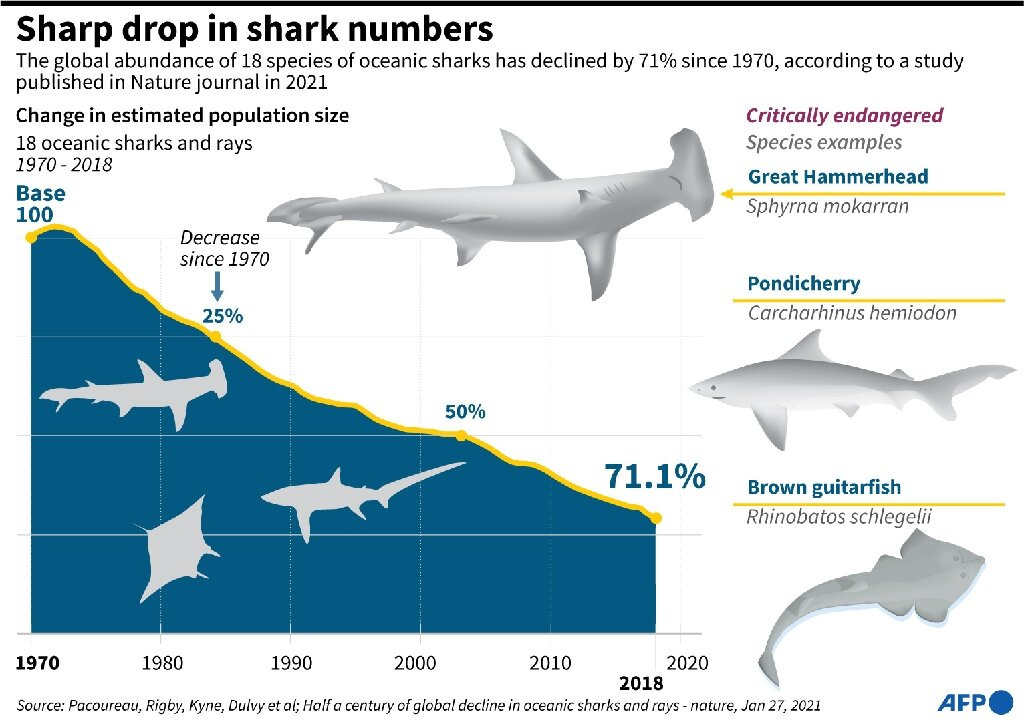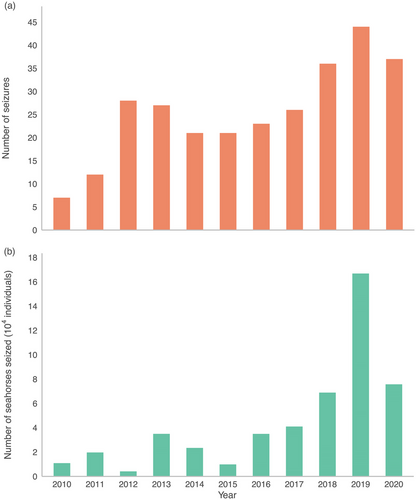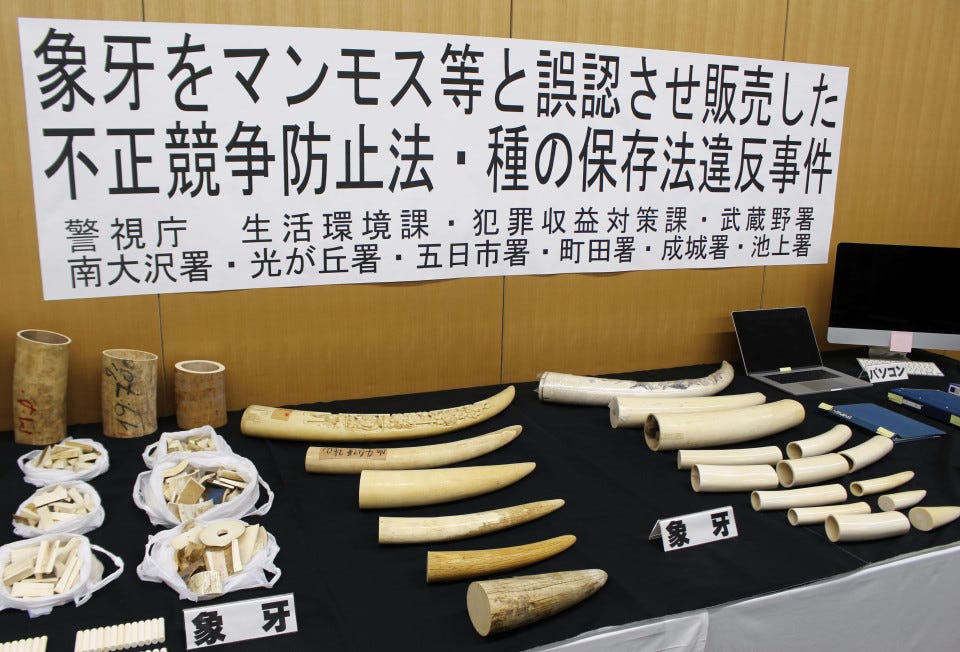The Wild Crime Report for Monday 9 June 2025
All about the oceans, leopard poaching, rhino horn trial in Malaysia and elephant ivory concealed as mammoth.
Welcome to the Wild Crime Report for another week.
Some of you may have seen that yesterday was World Oceans Day. Appropriately, this week’d report contains some stories related to the severe crisis that is the world’s water ecosystems.
In the last month, there has been attention brought about to the state of our oceans through a new film from the ‘Godfather’ of nature documentaries himself, Sir David Attenborough. Simply titled Ocean and available to watch via National Geographic, the film sets out to show audiences the dire state of affairs concerning 70% of our earth’s surface. While I’m sure there will be a focus on pollution and overfishing that is contributing to species loss and degradation of delicate ecosystems, it will be interesting to see how the film handles IUU (Illegal, Unreported and Unregulated) fishing and the various trafficking trades of sea products.
I intend to watch it this week and I encourage anyone who cares about the ocean crisis to do the same.
Now let’s get into some information.
Ecuador pauses commercial trade in protected shark species
A fairly timely development this week occurred when the country of Ecuador took the initiative of requesting a self imposed halt on trade in CITES appendix shark species. It will be welcomed by conservationists and law makers who recently pushed for CITES to upgrade around 90% of all shark species to the protected Appendix II list. The refusal by Ecuador to issue CITES export permits ‘until further notice’ could have a positive impact on local shark populations, although export remains legal in neighbouring countries like Peru and Colombia. Will there be movement of shark fin funnelled through these countries?
The shark fin trade remains constant with shark fin soup still on the menu in Asian markets notably in Hong Kong. Along with bi-catch of sharks, these two factors are believed to be the cause of a 70% drop in shark populations over the last half a century.
Ecuador is traditionally a major source for the shark fin trade so it will be interesting to see how long they pause all exports. It could also inform the discussion around greater protections for sharks with the upcoming CITES Conference of Parties (they happen every 3 years) in November 2025.
Seahorse smuggling increases over 10 year period
A recently released study of online reports of global seahorse seizures has indicated that seahorse trafficking has increased over the time period 2010 to 2021. The study was conducted by Project Seahorse with input and data from other organisations. Notably, the data was not comprehensive and did not include seahorse seizures that were not publicly reported by law enforcement agencies. This, along with the fact that much seahorse trafficking goes undetected, would suggest the trade could be even larger than what the open source records show.
Seahorses have protection via CITES as the entire genus of species (Hippocampus spp.) is listed as Appendix II, thereby limiting their international trade. However, given they are found in waters all around the world and the usual insatiable demand for them in Asia, seahorse trade remains to be a profitable business amongst other marine commodities.
Law enforcement sweeping across Australian waters
Policing the seas is not easy and often requires considerable resources that many countries don’t have. Enormous numbers of vessels across large bodies of water can be a challenge for even a modern Navy and border patrol units. Australia seems to be steadfast in it’s resolve to police it’s territorial waters however having stopped illegal shipping vessels in the last month that originate from Indonesia.
Their actions are not subtle other. The crew are promptly detained and prosecuted and usually deported after some jail time while their vessels are immediately destroyed at sea.
Hopefully efforts are being made to curtail the pressure from the other side, especially in Indonesia where economic hardship will continue to drive fishermen to take the greater risk of IUU fishing activity.
Leopard cats seized in Taipei
Last week, Taiwanese authorities reported that they had arrested three Vietnamese nationals in Taipei for allegedly poaching and trafficking leopard cats. The operation reportedly occurred in late May with police raiding a location where one of the suspects unwisely pointed a gun at them before fleeing the scene. He was later captured along with assorted wildlife products and homemade guns believed to be used for poaching.
The trio are suspected of hunting in a protected mountainous region and then selling the leopard cat products contrary to Taiwan’s Wildlife Conservation Act. Two of the men, identified as Nguyễn and Phạm, have been released on bail, while the third man Phan (who fled the police and was the owner of the firearms) is unsurprisingly bail refused. Phan is also reported as being in the country illegally having overstayed his visa period since 2020.
Major rhino horn case in Malaysia to proceed to trial
One of Malaysia’s biggest seizures of African rhino horn in 2021 is continuing through the courts. Two Malaysian men, Mohamad Sukry Wahab and Muhammad Hafiszan Naser, were arrested in September 2021 while driving a truck that was found to contain 50 rhino horns. They were stopped while driving in close proximity to Kuala Lumpur International Airport.
A Malaysian court has set aside dates in August 2025 for the defendants to mount a defence indicating that the prosecution had established ‘prima facie’ evidence that Wahab and Naser were aware of what they were transporting. It’s encouraging to see a case of this stature move forward in a country that has a history of being a hub for large-scale wildlife trafficking of products from overseas.
Elephant ivory sold as mammoth tusks in Japan
It has often been a concern that the legal sale of mammoth ivory tusks would provide an opportunity for highly protected elephant ivory to be laundered through the trade. And that’s exactly what occurred in Japan when last week police arrested four suspects for illegally selling around USD$695,000 worth of elephant ivory online across two years.
58 year old Nobumasa Daigo, the proprietor of Daigo Ivory Co., and three family members were charged for offences in relation to selling elephant ivory products that were mislabelled as ‘mammoth ivory’. There is no ban on trading in mammoth ivory in most countries given the species are not protected by CITES, unlike elephants which are Appendix I species.
Stay wild.












Ugh, the "mammoth" ivory loophole needs to be closed ASAP.